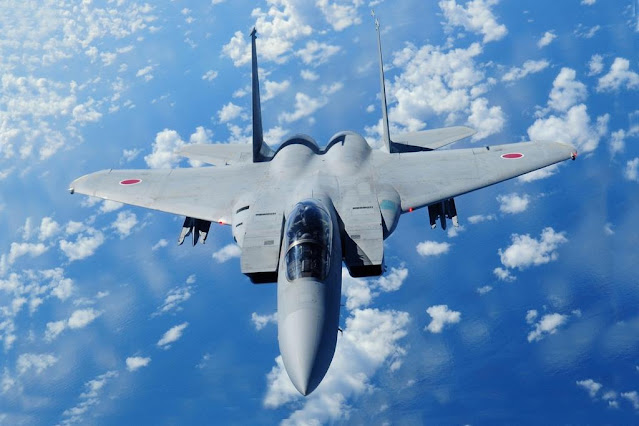Japan moves forward with F-15J Super Interceptor upgrade
 |
| Japan Air Self Defense Force F-15J ready to receive fuel from USAF KC-135 tanker aircraft. |
The Japanese government has included the modernization of the Japan Air Self-Defense Force (JASDF) F-15 fleet to the F-15JSI (Japan Super Interceptor) variant in its fiscal year 2022 budget.
The JSI program, launched in 2019, was halted in 2020 due to cost increases, partly due to the need for a new production line and the move to a new electronic warfare system. Following negotiations with the United States, the price was reduced by $ 8 million.
This cost reduction is mainly related to lengthy negotiations with the United States and Japan's renunciation of Lockheed Martin's Long-Range Anti-Ship Missiles (LRASM).
The JSI program aims to modernize most of the F-15 Eagles in service in Japan to allow them to operate beyond 2035. The modernization work will be carried out by the Japanese firm Mitsubishi Heavy Industries (MHI) with Boeing as sub-contractor.
As part of this program, MHI is expected to modernize 98 F-15Js that are part of the most recent batches, while the remaining 57 aircraft will be replaced by the advanced F-35.
The main benefits offered by the JSI include the introduction of the APG-82 (v) 1 Active Electronically Scanned Array (AESA) Radar, the Advanced Display Core Processor II (ADCP II) Mission System Computer and the ALQ-239 Digital Electronic Warfare System (DEWS ).
The JSI program, launched in 2019, was halted in 2020 due to cost increases, partly due to the need for a new production line and the move to a new electronic warfare system. Following negotiations with the United States, the price was reduced by $ 8 million.
This cost reduction is mainly related to lengthy negotiations with the United States and Japan's renunciation of Lockheed Martin's Long-Range Anti-Ship Missiles (LRASM).
The JSI program aims to modernize most of the F-15 Eagles in service in Japan to allow them to operate beyond 2035. The modernization work will be carried out by the Japanese firm Mitsubishi Heavy Industries (MHI) with Boeing as sub-contractor.
As part of this program, MHI is expected to modernize 98 F-15Js that are part of the most recent batches, while the remaining 57 aircraft will be replaced by the advanced F-35.
The main benefits offered by the JSI include the introduction of the APG-82 (v) 1 Active Electronically Scanned Array (AESA) Radar, the Advanced Display Core Processor II (ADCP II) Mission System Computer and the ALQ-239 Digital Electronic Warfare System (DEWS ).
Written by Matteo Sanzani
Image: USAF





No comments
All comments related to the contents of our articles are welcome. It is not allowed to post promotional messages, links to external sites, or references to activities not related to this blog.